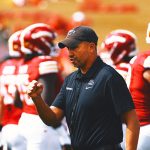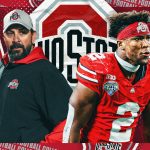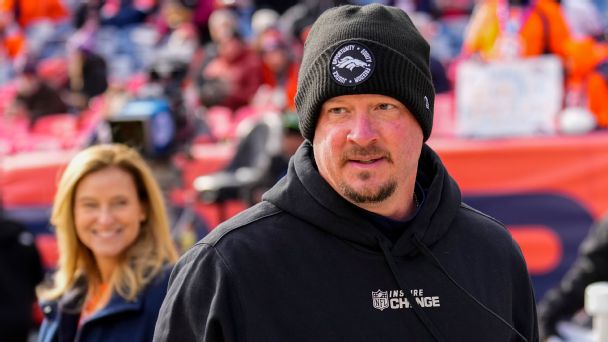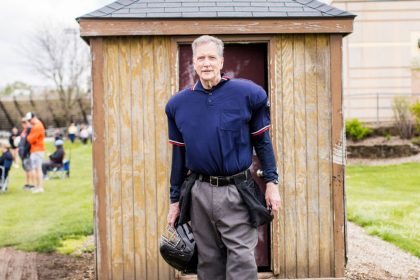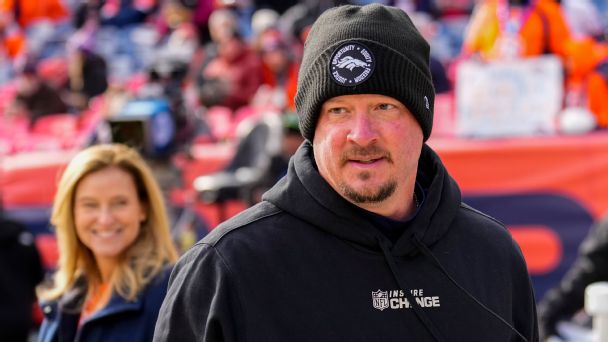
FLORHAM PARK, N.J. — Imagine making $80,000 a week for doing nothing. Sweet, right?
Nathaniel Hackett could’ve opted for that cushy lifestyle, collecting a reported $4 million a year through 2025 from the Denver Broncos. But, no. Instead of sitting out and kicking back, he’s digging in as the new offensive coordinator of the New York Jets.
Eager to restore his reputation after one disastrous season as the Broncos’ coach — he went 4-11, fired with two games left — Hackett last week accepted a position that, historically, offers little security. He’s the Jets’ ninth offensive coordinator in 13 years, but he put that aside — along with their well-documented quarterback issues — because he loves coaching and isn’t afraid of a formidable challenge.
“We’re really fortunate how much he believes in us as an organization,” coach Robert Saleh said. “He could’ve sat on the couch for [three] years.”
This is Hackett’s fifth NFL team in 10 years, but it’s a unique situation for him because it marks the first time he will start a season as the playcaller under a defensive-minded head coach. (He did it for seven games under Gus Bradley for the 2016 Jacksonville Jaguars, but that was as the interim coordinator following a midseason coaching shakeup.) In a sense, he’s the CEO of the offense, with the ability to shape the coaching staff and mold the unit to match his vision.
The Jets finished 29th in scoring, only three notches ahead of the Broncos, and they’re in “Help Wanted” mode at quarterback. It’s a big job for Hackett. He didn’t leave any money on the table — he’s still making his head-coaching salary, with the Jets chipping in — but he will have to earn it now.
A few key questions as he embarks on his new gig:
Can he convince old friend Aaron Rodgers to play for the Jets?
This is the question on everybody’s mind.
Hackett was the Green Bay Packers‘ coordinator from 2019 to 2021, earning a gold-embossed seal of approval from the legendary quarterback, who won two of his four NFL MVP awards with Hackett on staff. He didn’t call the plays, but they forged a close relationship. Now the assumption is that Rodgers will want to reunite if he goes on the trading block.
On Tuesday, Rodgers said it’s too early to make that leap, claiming he still hasn’t decided if he wants to continue playing. But he left no doubt about his feelings for Hackett, calling him one of his favorite coaches.
“Love Hack. Hack is my guy,” Rodgers said during his weekly appearance on “The Pat McAfee Show.” “Love him and Megan and the kids. They’re really special to me. We really bonded when he was in Green Bay. He made it fun. He made the room fun. He made the weeks fun.”
As much as he admires Hackett, Rodgers acknowledged there was a learning curve in 2019. In an October interview, he said, “We had kind of an up-and-down year the first year and then really took off the second year.”
The Jets have made no secret about their desire to add a veteran quarterback. Rodgers is one of their prime options.
For a variety of reasons, former coordinator Mike LaFleur wasn’t able to connect with the former first-round quarterback, who struggled in his first two seasons. The job falls to Hackett, who will look to add a senior offensive assistant or passing-game coordinator who can assist with the quarterbacks. Quarterback coach Rob Calabrese remains on staff.
Hackett doesn’t have a track record for developing young passers, but let’s be fair: He has yet to hit the quarterback lottery. His past quarterbacks include EJ Manuel, Thaddeus Lewis and Kyle Orton with the Buffalo Bills, and Blake Bortles with the Jaguars. With Denver, he had a seemingly diminished Russell Wilson.
Unsolicited, Saleh remarked that Hackett has had “tremendous relationships” with all his quarterbacks. Much like Saleh, Hackett is a high-energy, upbeat coach who appreciates the teaching aspect of the job. Wilson is said to be excited about Hackett — he knows how much Rodgers likes him — but it’s fair to wonder if it’s the right scheme fit.
“The foundation of this offense is rhythm and timing. So was Mike LaFleur’s,” said ESPN analyst Dan Orlovsky, a former NFL quarterback. “If Zach is going to be part of this football team for as long as Hackett is the coordinator, he’s going to have to really, really, really get better at and attack what he has not shown.”
In what area can Hackett make the biggest impact?
The rushing attack, no doubt.
The Jets were dreadful (25th in yards), and it had a domino effect on the entire offense. Hackett presided over the NFL’s No. 2 rushing attack in 2013 (Bills) and the No. 1 in 2017 (Jaguars). Even though the Broncos were a hot mess in 2022, they still managed to finish 17th in yards per carry. And that was with only four games from top runner Javonte Williams, who suffered a season-ending knee injury.
Hackett, who uses an outside-zone system (as did LaFleur), has a knack for scheming up yards on the ground. He knows how to camouflage formations, making runs and passes look alike. This bodes well for running back Breece Hall, who thrived in the scheme before a season-ending ACL tear in his left knee. The Jets are hoping the addition of veteran offensive line coach/run game coordinator Keith Carter, known for his high intensity, also will spark the ground game.
By the way, Hackett hasn’t been married to a backfield-by-committee in the past. In 2017, the then-Jaguars running back Leonard Fournette had 268 attempts, seventh in the league.
Will Hackett turn Garrett Wilson into a superstar?
In six seasons as a playcaller (two in Buffalo, three in Jacksonville, one in Denver), Hackett has failed to have a single player selected to the Pro Bowl. That covers everybody — quarterbacks, skill players and linemen. He has had only one 1,000-yard rusher (Fournette) and no 1,000-yard receivers. This doesn’t count his three years with the Packers, who had many outstanding individual seasons over that span; their playcaller was — and is — coach Matt LaFleur.
Should Wilson, coming off a 1,103-yard receiving year as a rookie, be worried?
Know this: Hackett has a flair for combining route concepts to get receivers into space. On targeted passes, the Broncos finished first in average separation (3.9 yards) and first in “open” receivers (54%), according to NFL Next Gen Stats. (An open target is when the separation between receiver and nearest defender is 3-plus yards.) They also had a high open rate out of the slot (50%), which should appeal to receiver Elijah Moore, who was so unhappy with his targets last season that he requested a trade.
So, yes, Hackett’s Denver offense had open receivers all over the field. Getting the ball to them was the problem.
What’s the biggest concern with Hackett’s system?
Pass protection.
The Broncos allowed a league-high 63 sacks, including 52 in shotgun. Despite injuries on the offensive line, Hackett stubbornly used heavy doses of his three-receiver package even though they couldn’t block it up. He was criticized for failing to adjust, and those issues were amplified after he was fired because Russell Wilson looked more comfortable in the final two games than he did with Hackett in charge.
The Jets are planning to revamp their line, which could have two or three new starters. Hackett, who will have a say in the process, must be more flexible with regard to fitting scheme to personnel. The addition of a senior assistant could provide a checks-and-balances system that helps Hackett flourish. While interviewing with the Jets, he acknowledged last season was a learning experience and there are “things that he wishes he could go back and fix,” according to Saleh.
Now Hackett gets a fresh start.

